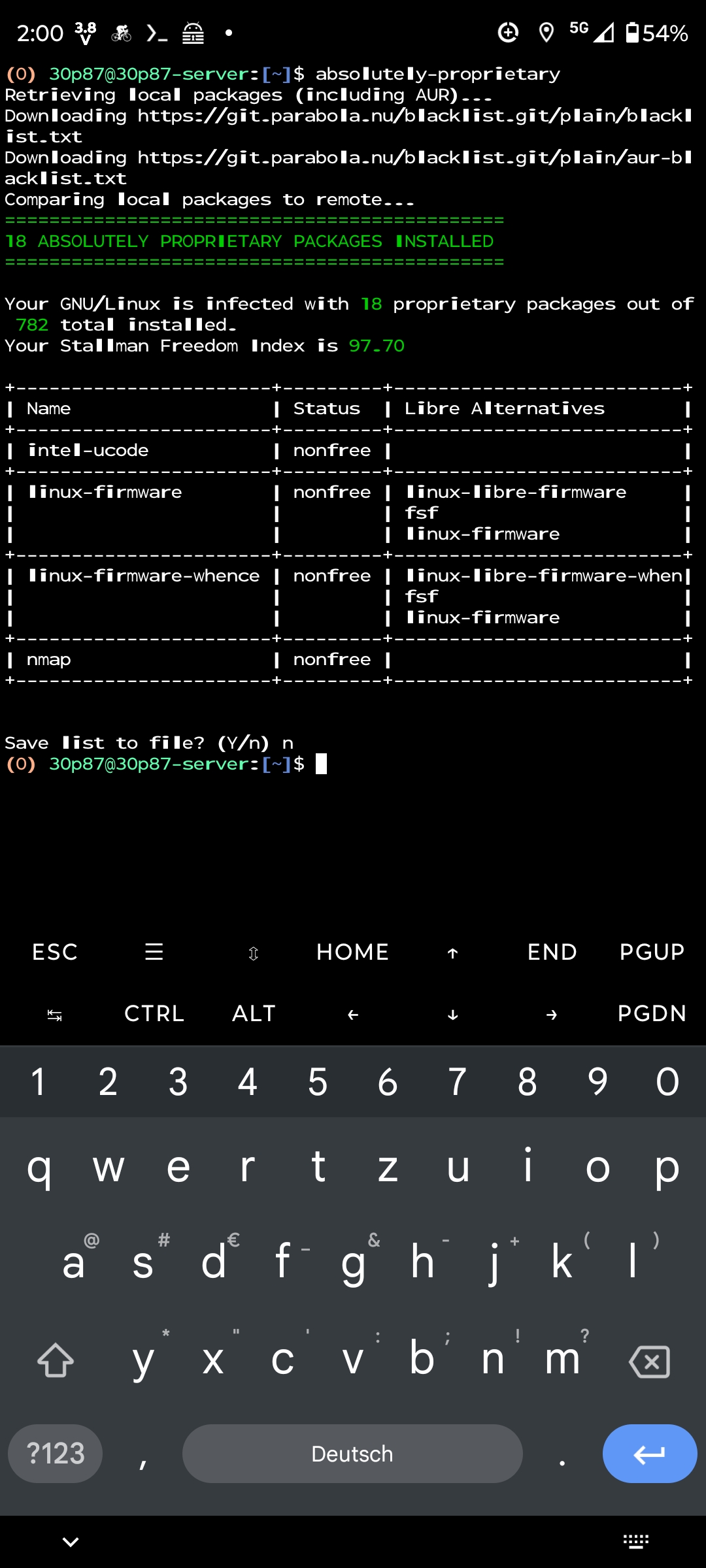I have all the blobs, I like my hardware to work
FOSS-y
- 3D: Blender
- Automation: Python, Ansible and Bash
- Calendar: ProtonCalendar
- Chess: Lichess
- DesktopOS: Pop!_OS
- Drive: ProtonDrive
- eBook: Calibre
- E-Mail: ProtonMail
- FOSS Android Apps Center: Droidify
- Flashcards: Anki
- Git Repos: Codeberg
- IDE: AstroNvim
- Keyboard: Keychron Q1 HE QMK
- Laptop Firmware: Coreboot
- Maps: OpenStreetMap and OrganicMaps
- Messenger: Signal
- Music Player: cmus
- Office: LibreOffice
- Password Manager: Bitwarden
- RaspberryPi: Raspbian
- Raster: GIMP
- Recording: OBS and GPU Screen Recorder
- Shell: Fish
- SmartphoneOS: GrapheneOS
- Terminal: Alacritty
- Torrent: qBittorent
- Tried Game Engines: Bevy and Godot
- Typing Test: Monkeytype and Keybr
- VPN: Mullvad
- Vector: Inkscape
- Video Player: mpv and VLC
- Virtualization: Quickemu
- Weather: OpenMeteo

I don’t know what to say about people who I told about lichess but still think chess.com is better

Maybe just say why it is better:
- No ads / subscriptions
- No tracking
- Free software is really fast
- You can do many projects with Lichess
- Clean non-cluttered UI
So, in summary, it’s not hyped up (marketing), clean, no tracking, free chess.com experience.
I don’t know what are the advantages’ chess.com has over Lichess right now. The chess should be free.
Chess dot com tells me what opening I played
(Because Lord knows I don’t)
Lichess does tell too.
Not during the play though, only during analysis
Ah I see so you can look up in game what are the best responses for your opening. Smart.
Why todoist and not tasks.org
I cannot get the same features on the desktop so it’s synced up. Besides that only Taks.org on Android is even better than Todoist.
I use nextcloud for tasks and then use tasks.org on android, not sure what features you need, but that has worked great for me
I have to try NextCloud Tasks then. I’m also considering Vikunja.
Why Obsidian when there’s so many good foss note-taking apps?
You could list it, but I tried to migrate Obsidian to Logseq. For now, I have no time. I mostly write MarkDown though.
Ages ago someone wrote a bash script that would calculate your “stallman score”, essentially checking the license of every package in your system.

absolutely-proprietary?
nmap isn’t Foss?!?
From absolutely-proprietary:
“the FSF considers the v7.9x license to be non-free - however, the previous license was apparently non-free also”That’s all I know
Well, we need that back!
It’s called vrms (virtual RMS) and Debian at least packages it.
7 out of 705 installed packages are non-free packages on my RPi server.
It’s called check-dfsg-status since Stallmann stepped down after his controversial statements in Minsky’s Epstein scandal.
100% except the damn firmware and things I can’t change
Libreboot + GNU/Linux-Libre Guix System
Please, more details
Irony? Hahah
No I genuinely want to know
Well for libreboot i had to program the bios eprom (SOIC-8 SPI programable). For that i used a chinese CH341a programmer which didn’t work (IMPORTANT: first i had to fix the chinese design hardware problem that the ch341a has were it uses 3.3v as vdd but 5v as high level for digital spi signals) because of the shitty cables of the kit. I tried with a rpi pico with the same cables and also didn’t work. Then i literally knitted cables one by one in each of the eprom pins in order to program it and it worked. My advice: don’t use cheap chinese SOIC clips/cables. The CH341a can be fixed but if you can, also don’t use it. They have a bug in their hardware design and they don’t fix it.
After that i just installed Guix system iso in a pen and proceeded with the installation. I did a full encryption install (FULL all /boot included) because with libreboot you can have grub in your eeprom which is awesome. So basically i have a permanent bootloader that launches at start (besides all the other stuff libreboot does about neutering intel management engine, etc)
Then i followed more or less this in order to create the config file of the system. Once the config file is created you gust run guix and it does everything: configuration, compiling software if needed, etc.
And basically that’s it. Well i also searched for a pci wifi card that had free software drivers in h-node.
Libreboot is very cool. You can change bios “variables”, like for example modifiying your laptop hardcoded company MAC address for a random one (which I did). You have to do that when you are compiling the image that you will write into the eeprom.
Ah and btw Linux-Libre is just the default kernel for guix system. Basically 0 bloat. There are people channels that have guix system with bloat, but Guix by default is bloat free (well in reality only if you install libreboot too like i did :) ). That’s why i bought a libre software compatible wifi card.
But Guix system can also be build with Linux, systemd ( the initd is shepherd) and other stuff if you configure it like so. But in order to do that you will have to read the Guix manual probably.
Basically a hobby project. I wanted to have a fully free computer. So i bought a x220 on ebay and did all that to have the fully free laptop.
Guix can be used as a kind of package manager in any other distro. And it has super cool features. It’s worth checking out just for that. It follows the classical GNU filosofy of “hack with your computer as much and deeper as you want”.
Guix system is perfect if you want to mess around, because you can just revert back in time your whole system.
Saved
Excluding hardware (microcode, UEFI, etc); within my Linux system, the only proprietary software I have installed are Nvidia drivers and Steam (installed via flatpak). When I first made the switch to Linux, I was actually shocked at the minimal amount of proprietary software I actually used/needed.
I don’t run Linux anymore, though this should change sometime next year. I use Blender and Krita for work, QOwnNotes for note-taking, Firefox for the web, QBittorrent for sharing holiday films, etc. For image editing I use Affinity, probably the only notable proprietary program on my system apart from Windows.
deleted by creator
Pretty FOSS?
PC - Thinkpad T14s Gen 4: EndeavourOS, Firefox and Thunderbird with the Proton suite of things such as Mail, Pass and VPN - I do pay for them but I think it’s worth it.
Phone - Pixel 8 with GrapheneOS and as many F-Droid apps as possible. Proton apps for Mail, Pass, Drive, VPN. Cromite browser. The only that aren’t are probably my banking apps, but I could always switch to web I guess.
I think my biggest hurdle is a Map app that has traffic data that isn’t Google maps.
Have you tried OrganicMaps? You can download the map for your state (or states) and it works extremely well offline, with the one downside, being not all specific addresses have been uploaded… but you can sure find the street and the UI is unmatched for FOSS map apps.
Edit: I didn’t see the community, sorry, feel free to disregard this comment lol
Phone OS: GrapheneOS Calendar: Fossify Calendar Files: filen.io Gallery: Fossify Gallery E-mail: ProtonMail Notes: Notesnook Keyboard: HeliBoard Maps: OrganicMaps Passwords: Proton Pass RSS: Feeder Step counter: Forest YouTube frontend: NewPipe, FreeTube Weather: Breezy weather
I still use services like Spotify, FB Messenger, and Play services for some of my banking apps. I’m a bit new to this whole privacy thing and custom ROMs, but so far it feels good. When I buy a computer I’ll install Linux on it.
All FOSS except Nvidia drivers and processor microcode!
next graphics card will definitely be an AMD
UEFI?
damn you got me
Laptop is foss except bios. Desktop has apu and wifi firmware.
Linux desktop with an Nvidia GPU, two Linux laptops, android phone. I’m struggling to think of any closed source productivity apps I still use, and I play games from Steam. NAS is running whatever Synology crap it came with, I haven’t tried fucking with the firmware on my Epson, my 3D printer runs Marlin and my laser engraver runs GRBL.
Id say around 80% since I use a lot of foss programs and only use linux/android/openwrt/brother printers. The other 20% is random proprietary stuff like steam I guess to be generous.
Almost everything. All Linux machines, SO included. Self-hosted most everything for a loooooong time, but with Obtainium now I’m really close to ditching the Play Store, too.











